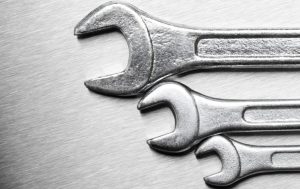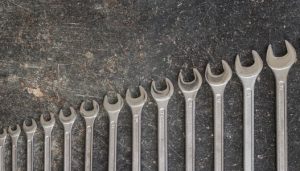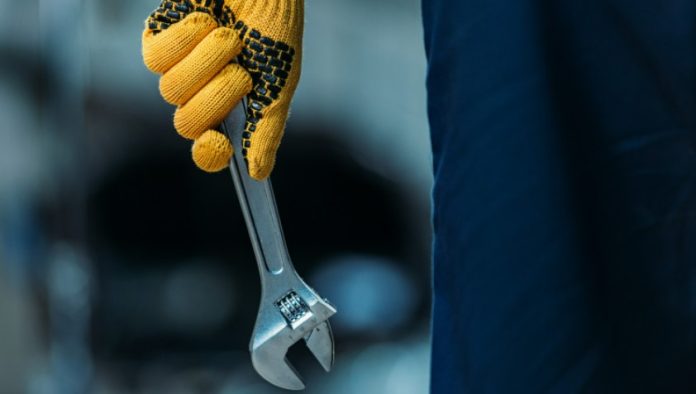Table of Contents
Spanners are one of the most common tools found in the tool kit. They are used frequently in both domestic and industrial settings for fastening and loosening hexagonal shaped nuts and bolts. Spanners are constructed from chromium-vanadium-steel, other steel alloys or beryllium copper, and are usually chrome plated.
What Material Are Spanners Made From?
Chromium-vanadium steel spanners
Chromium-vanadium steel (Cr-V) is a group of steel alloys that are used for their hardness and durability. The group incorporates carbon, manganese, silicon, chromium and vanadium.

Adding chromium and vanadium contributes to the steel hardening process. This process involves first heating the alloys to above the critical transformation temperature for the material. They are then rapidly cooled which transforms the initial material into a stronger and harder composite. The cooling process can involve quenching in oil, water or other liquids. The hardened material is then tempered which improves stability and toughness. Tempering occurs after the quenching and involves reheating the steel alloy at a quite low temperature, which instigates precipitation and spheroidization of the carbides.
Beryllium copper
Some spanners are constructed out of beryllium copper (CuBe). This copper alloy has very high strength and is non-magnetic and non-sparking. Berryllium copper spanners are used in hazardous work places including the mining, gas and petrochemical industries.
Standard Steel Alloy
For heavy industrial use such as in shipyards, railway manufacturing, construction companies and maintenance, standard alloy steel spanners are preferred by tradesmen and technicians. They often come with a gunmetal finish such as the Bahco 60mm single ended open spanner.
Chrome plating

The process of chrome plating involves using electroplating to apply a thin layer of chromium onto the steel alloy. This seals the metal and reduces incidences of abrasion, oxidation or rusting and corrosion of the construction material. Chrome plating also helps with maintenance and cleaning of the spanner. The finish can be matte or bright.
Nickel-chrome plating
Some spanners will come with a nickel-chrome plating. This is made by electroplating a thin layer of nickel onto the tool before the chrome plating. This process adds smoothness and increases the corrosion resistance.
Satin chrome plating
Some spanners like the Facom Satin Chrome Combination spanner have a satin chrome finish which helps with durability in rugged working conditions. This process involves polishing the metal prior to and after the plating.
Insulated spanners
Chromium vanadium steel spanners are also available with a two-layer insulation coating as a safety procedure for people who work with live electrical circuits. The 6 mm RS PRO Insulated Open Ended spanner, for example, can be used on live circuits up to 1000 volts with safety. These spanners are available in a wide range of sizes.

Whether you need an open ended spanner, ratchet, ring or C-spanner, the type of material will need to be hard, enduring and reliable. Spanners are constructed in mainly hardened chromium-vanadium steel, though other steel alloys are also available. Plated spanners offer higher resistance to corrosion and oxidation and can be easier to grip. For more information about a suitable spanner for your needs, contact a spanner expert at RS Components.


